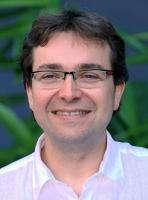An international research scientist who develops virtual simulators for training physicians capped a three-day visit to Wright State with a seminar to discuss the state of the technology and to encourage Ph.D. students to consider a dual-degree program with a university in France.
The April 9 talk by Cedric Dumas, a scientist at the Australian e-Health Research Institute in Brisbane, drew students, faculty and medical professionals to the Pathfinder Lounge in the Student Union. The seminar was sponsored by the College of Engineering and Computer Science and the University Center for International Education.
Dumas’ research is aimed at improving learning and training in the medical field through the use of virtual environments. During his talk, he showed simulations of bronchoscopies and colonoscopies. The seminar produced a robust discussion revolving around the benefit of virtual training.
“There is this challenge between the advance in technology that can achieve a lot of things and the way to use that technology to provide medical education,” Dumas said.
Dumas was invited to visit the university by Wright State’s Caroline Cao, Ph.D., the Ohio Research Scholar for the Ohio Imaging Research and Innovation Network (OIRAIN) and an expert in human factors of medical systems.
Dumas is also a professor and researcher at the Ecole des Mines de Nantes, a renowned school of engineering in Nantes, France. Wright State has a dual-degree program with Ecole Centrale de Nantes.
“This is a great way to build collaboration for faculty, for researchers across institutions, across countries, and also allow our students the global perspective,” Cao said. “This is also a response to the national demand for training the future workforce—engineers, scientists who are globally aware.”
The College of Engineering and Computer Science is working with UCIE and the Wright State International Gateway to implement articulation agreements with other universities at the grassroots level, using students, faculty, staff and researchers as ambassadors.
“This strategy will help us in building strong connections with faculty and staff from other global campuses,” said Swapna Nair, director of the CECS International Collaborations and Graduate Programs.


 Wright State to expand nursing facilities to meet workforce needs and prepare more graduates for in-demand careers
Wright State to expand nursing facilities to meet workforce needs and prepare more graduates for in-demand careers  Wright State student-athletes make a lasting impact on local family with more to come
Wright State student-athletes make a lasting impact on local family with more to come  Wright State names Rajneesh Suri dean of Raj Soin College of Business
Wright State names Rajneesh Suri dean of Raj Soin College of Business  ‘Only in New York,’ born at Wright State
‘Only in New York,’ born at Wright State  Wright State president, Horizon League leaders welcome new commissioner
Wright State president, Horizon League leaders welcome new commissioner 